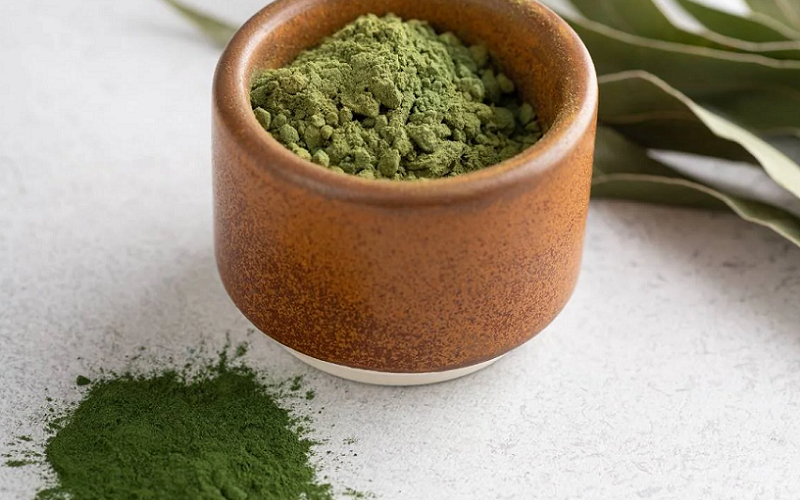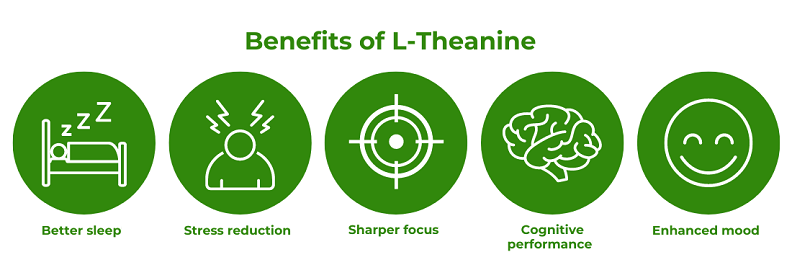
In an age where the buzz of technology and the pace of modern life continually fragment our attention, finding natural ways to enhance concentration and focus is more important than ever. Enter L-Theanine, a unique amino acid predominantly found in green tea leaves, renowned for its calming yet alerting effects on the brain. This unassuming compound has piqued the interest of neuroscientists and wellness enthusiasts alike for its potential to improve cognitive functions, particularly concentration and attention.
Contents
Understanding L-Theanine
L-Theanine, often hailed as a natural nootropic, is a compound that has captured the interest of both the scientific community and those seeking cognitive enhancement.
Chemical Properties of L-Theanine
L-Theanine is an amino acid, but not just any amino acid. It’s unique in that it’s not commonly found in the human diet, primarily occurring in tea leaves, particularly in green tea. Structurally, it resembles the neurotransmitter glutamate, which plays a key role in brain function. This resemblance allows L-Theanine to cross the blood-brain barrier, a critical factor in its effectiveness as a cognitive enhancer.
How L-Theanine Works in the Brain
Understanding how L-Theanine influences brain function is key to appreciating its role in enhancing concentration and attention.
Interaction with Neurotransmitters
The primary mechanism by which L-Theanine exerts its effects is through its interaction with various neurotransmitters. Neurotransmitters are the brain’s chemical messengers, and L-Theanine has a significant impact on them, especially those related to stress and relaxation.
L-Theanine is known to increase levels of GABA, a neurotransmitter that promotes relaxation. This increase in GABA helps to reduce feelings of anxiety and stress. Additionally, L-Theanine elevates dopamine and serotonin levels, both of which are crucial for mood regulation. These changes in neurotransmitter levels contribute to a state of relaxed alertness, enhancing cognitive functions without the jitteriness often associated with stimulants [1].
Influence on Alpha Brain Waves
One of the most fascinating aspects of L-Theanine’s effect on the brain is its influence on brain wave patterns. Electroencephalogram (EEG) studies have shown that L-Theanine increases the activity of alpha brain waves. These waves are associated with a state of “wakeful relaxation” – the state of mind you experience when meditating, being creative, or daydreaming. This state is incredibly beneficial for concentration and attention as it combines alertness with relaxation, providing an ideal mental environment for focused tasks.

L-Theanine’s Impact on Concentration
In exploring L-Theanine’s contribution to cognitive health, its impact on concentration stands out as particularly significant. Concentration, the mental effort of directing and focusing cognitive resources on a task, is critical in almost every aspect of daily life. L-Theanine’s unique properties have shown promise in enhancing this vital cognitive function.
Overview of Concentration and Cognitive Function
Before delving into how L-Theanine aids concentration, it’s important to understand what concentration is in the context of cognitive function. Concentration refers to the ability to focus one’s attention on a specific task while filtering out distractions. It involves various brain functions, including attention, working memory, and executive function, all harmoniously working together to maintain a state of focused alertness [2].
Scientific Evidence Linking L-Theanine to Improved Focus
L-Theanine’s role in enhancing concentration is not just anecdotal; it is grounded in scientific research.
Detailed Review of Key Studies
Several studies have investigated L-Theanine’s effects on focus and concentration. For instance, one study published in the Journal of Nutritional Neuroscience reported that subjects who consumed L-Theanine exhibited improved accuracy and reaction times in attention-switching tasks compared to the placebo group. These findings suggest that L-Theanine can enhance the brain’s ability to concentrate, especially in situations requiring quick shifts of attention.
Analysis of L-Theanine’s Effect on Sustained Attention
Sustained attention, or the ability to maintain focus over extended periods, is crucial in many aspects of life, from academic examinations to professional projects. Research indicates that L-Theanine may positively influence this aspect of concentration.
A study involving participants performing a demanding cognitive task found that those who took L-Theanine showed not only improved performance but also reported feeling less mentally fatigued. This indicates that L-Theanine could be particularly beneficial for tasks that require prolonged mental effort [3].

L-Theanine and Attention Span
The ability to maintain a steady focus over time, commonly known as attention span, is a critical aspect of cognitive functioning, directly influencing productivity and learning. L-Theanine’s influence on attention span, particularly in our increasingly distraction-filled world, is a subject of considerable interest and research.
The Challenge of Maintaining Attention in a Distracted World
In today’s fast-paced and information-rich environment, maintaining a consistent attention span has become increasingly challenging. Distractions are a constant, and the ability to focus is often compromised. This is where L-Theanine steps in, offering a potential solution to enhancing attention span amidst these challenges.
How L-Theanine Enhances Attentional Control
L-Theanine has shown promising effects in enhancing attentional control, a key component of a healthy attention span.
Research Insights into Attention Span Improvement
Research studies have provided insights into how L-Theanine can enhance attention span. One notable study found that participants who consumed L-Theanine showed improved performance in tasks requiring sustained attention and better task-switching capabilities. These improvements are attributed to L-Theanine’s ability to promote relaxation without sedation, a state that is conducive to maintaining focus over longer periods [4].
Case Studies on L-Theanine’s Role in Minimizing Distractions
In addition to controlled studies, anecdotal evidence and case studies have also highlighted L-Theanine’s role in minimizing distractions. For example, individuals who consume L-Theanine regularly often report an increased ability to concentrate in noisy or busy environments, suggesting that L-Theanine may help in filtering out irrelevant stimuli, thus enhancing the ability to stay focused.
L-Theanine’s Role in Multitasking and Cognitive Flexibility
Multitasking and cognitive flexibility are increasingly important in our fast-paced world where juggling multiple tasks simultaneously is the norm. L-Theanine’s potential role in enhancing these aspects of cognition is an area of growing interest, offering insights into how this natural compound can support complex cognitive processes.
The Demand for Multitasking in Modern Life
In today’s society, the ability to multitask effectively is often seen as a valuable skill. Multitasking requires rapid switching of attention between different tasks, a challenge for our cognitive resources. However, effective multitasking is more about cognitive flexibility – the ability to adapt our thinking and attention swiftly and efficiently – than doing many things simultaneously [5].
L-Theanine’s Potential in Enhancing Cognitive Flexibility
L-Theanine’s influence on cognitive flexibility and multitasking is an area ripe for exploration.
Insights from Research on Cognitive Flexibility
Research on L-Theanine’s impact on cognitive flexibility is still emerging, but early studies show promising results. For instance, some studies suggest that L-Theanine’s ability to enhance alpha brain wave activity may be linked to improved cognitive flexibility. These alpha waves are associated with a relaxed yet alert state, crucial for quickly adapting to new information or changing task demands.
How L-Theanine May Support Multitasking
In terms of multitasking, L-Theanine’s potential lies in its ability to improve focus and reduce stress. By fostering a state of calm alertness, it may help individuals switch between tasks more efficiently, with less cognitive strain and reduced mental fatigue. This could be particularly beneficial in high-pressure environments where quick thinking and adaptability are essential.
References
[1] Effects of l-theanine on attention and reaction time response
[2] What You Need to Know About L-theanine
[3] L-theanine improves neurophysiological measures of attention in a dose-dependent manner
[4] L-Theanine
[5] Here’s What You Need To Know About L-Theanine

